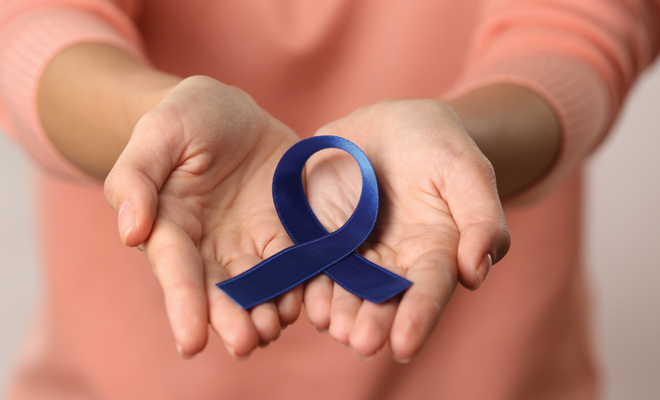
Colorectal Cancer Awareness Month
Claudia had been feeling tired and sluggish for a few weeks. One morning, she noticed bright red blood on the toilet paper after using the restroom. She was worried, since this was unusual for her, but also attributed the instance to some recent constipation.
Although she didn’t experience blood in her stool again, she did notice other changes. Claudia was pretty regular, but she began using the restroom four or five times a day, often feeling like she wasn’t totally emptying her bowels. At a close friend’s urging, Claudia decided to make an appointment with her family doctor. Three weeks later, at the age of 48, Claudia was diagnosed with colorectal cancer.
One in 24 women and 1 in 22 men will be diagnosed with colorectal cancer during their lifetimes. Colorectal cancer is the third most common cancer for both women and men. The American Cancer Society estimates that 101,420 people in the United States will be diagnosed with colorectal cancer this year and about 51,020 will die. It is important to note that one in three people are not up to date on their colorectal screenings.
What is it?
Colorectal cancer can begin in either the colon or the rectum; it is named according to where it starts. Colon cancer and rectal cancer are often grouped together because they have many qualities in common.
Generally, colorectal cancers develop as a small polyp, which is a growth on the inner lining of the colon or rectum. Over time, polyps can change into cancer, but not all polyps become cancerous. Many factors determine if a polyp will turn cancerous, such as the kind of polyp, size, number of polyps and if the polyp contains dysplasia, a condition in which the cells look abnormal, yet they don’t look like true cancer cells. Once it is large enough, the polyp develops cancer and starts to spread. Often this process takes years.
Treatment
Colorectal cancer treatment varies depending on the size and extent of the cancer. If the cancer hasn’t spread to other areas, surgery is usually the first step, followed by chemotherapy treatment for about six months.
If the cancer is larger or has grown through nearby tissue or the wall of the colon, surgery to remove that section along with nearby lymph nodes may be the only treatment needed. Often, however, doctors recommend adjuvant or combination surgery with chemotherapy if the cancer is at high risk for returning. If the cancer is well advanced, radiation is often used to prevent pain or relieve other symptoms. This treatment may shrink tumors for the time being, but a cure is not likely.
Screenings
Since it can take as long as ten years for a polyp to become malignant, it definitely can be caught early. Sixty percent of colorectal cancer deaths could be prevented with basic screenings; early detection makes it much easier to treat. For most people, regular colonoscopies should start at age 50 and be repeated every ten years.
Colonoscopies are not the only choice for detecting abnormalities. A flexible sigmoidoscopy looks at only the bottom third of the colon, where 60 percent of cancers occur. Stool tests are also valuable. A newer type of stool screening is stool gene testing; instead of testing for blood, the lab looks for certain genetic changes that can indicate colon cancer. Each test has its pros and cons. Patients should discuss the test that is most appropriate for them with their doctor.
Prevention
Although a family history of colorectal cancer is the biggest risk factor, other lifestyle choices increase the chances of getting the disease, including smoking, lack of exercise, being overweight and high body fat around the waist. Additionally, eating too much red or processed meat and excessive alcohol use can increase a person’s risk of getting colorectal cancer.
Interactive online tools can help anyone estimate their likelihood of developing colorectal cancer. If you or a loved one are experiencing any symptoms, such as blood in the stool, bleeding or changes in bowel habits that last longer than a month, get it checked out by your doctor. ■
Sources: healthfinder.gov, cancer.org, mayoclinic.org and fightcolorectalcancer.org.
Be Aware of Colorectal Cancer Symptoms
Some people don’t experience symptoms in the early stages of colorectal cancer. And, depending on the size of the cancer and where it’s located in the intestine, signs will vary and may include the following:
• Changes in bowel consistency habits, such as constipation or diarrhea that last longer than a month
• Blood in the stool
• Cramps, gas or pain in the stomach
• A feeling that your bowel doesn’t empty completely
• Stool that is thinner than normal
• Weakness or fatigue
• Unexplained weight loss or loss of appetite
• Nausea or vomiting







